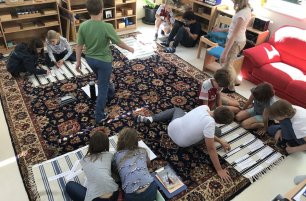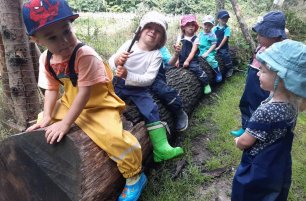What comes after kindergarten
The Montessori Elementary classroom is a dynamic system led by carefully trained teachers to enhance the learning of the 6 to 12-year-old student by aligning with their stage of development.
When studying children, Dr. Maria Montessori observed different characteristics in specific ages, and grouped them accordingly. She called these groupings the Planes of Development, as seen in the diagram above/below. This is the framework through which the Montessori teacher views each child, knowing that learning and development will happen with more ease and greater outcomes if the environment and the adult’s expectations match the evolving needs of the child.
Montessori utilizes mixed-age groups in which the needs of all in that range can be met together; in fact, they benefit from relating to their younger and older peers within the group. Entering the Lower Elementary classroom, we see a big shift in the children’s approach to learning - wanting greater independence from their family and turning towards their friends instead. In the Upper Elementary classroom, this process continues, with some characteristics becoming more pronounced. As the child moves through the second plane, personal and academic growth is enhanced by first building a foundation of skills in a "period of construction" and then experiencing a "period of consolidation" in the latter half of the plane.

The Reasoning Mind
While the Primary classroom is set to work with the child’s Absorbent Mind, the Elementary classroom is designed to work with the child’s reasoning mind. They are finished with learning what things are and now want to understand why they are. In the Elementary years, they naturally desire a deeper dive into intellectual independence.
In the classroom, time and space are allowed for discussing, questioning, and proposing new ideas and different ways to do things. Questions are welcomed and explored, never admonished. It is not a “do what you’re told'' environment. It is a community working together.
With this understanding, Dr. Montessori created inspiring stories to spark the imagination of the child: The Great Lessons. This special work gives space for students to ask big questions and look for the answers. They do so with their friends, getting excited about their discoveries.
Social Beings
Friends are everything at this age, because of the child’s need to develop more social independence. Family has given the child security in the first six years of life and now they are ready to be in larger social groups. The child wants to feel part of society and we give them that.
The teacher allows, encourages, and guides students to work together to learn from each other. They are much more interested in learning from their peers than from their teachers or parents. They self-organize socially and the teacher’s role is to balance and support this natural inclination, teaching respect with independence and guiding the children to balance their social and work time.
Intellectual independence
The Elementary child is craving knowledge, filling their mind with information about the world around them. You can see this start in Kindergarten as they are delighted by “big work”. As they move through the Elementary stage they are ready to apply their knowledge to deeply meaningful work, developing a true love of learning.
In the classroom, the teachers can go with the flow of the child, allowing a student to follow their natural desire to maximize the moment of inspired learning. For example, they may agree to let a child take a pause on their spelling so they can complete all the word study activities and feel that big sense of accomplishment. The teacher is trained to direct them back to the other subjects when this burst of inspiration settles. There is a constant delicate balance between the demands of the curriculum and the spark of individual motivation. Being allowed this flow enhances the students' enjoyment and ownership of their studies.
In the Upper Elementary classroom, the students need even more purpose and inspiration, so the teacher encourages them to apply what they’ve learned to meaningful projects, to share them with the community, and to take on supporting causes in the world at large.

A Shift of Order
External order was a strong need before age six. This natural tendency continues but shifts; the child’s need for order becomes internal as their energy becomes focused on intellectual pursuits. On the outside, they might seem disorganized and forgetful. On the inside, they are however building up an important - and orderly - intellectual structures.
The adults in their life need to patiently guide and structure the external order for the child, which becomes an easier task when you understand what is happening internally. In the classroom, order is maintained, but teachers are sensitive to this internal processing.
Morality and Justice
Children become engaged with a strong interest in justice and right and wrong. This is supported in the classroom by the emotional curriculum and opportunities to discuss and process their emotions and the conflict or social conundrums. The child is now actively building the moral conscience that will see them through the challenges of teenage years in the next plane of development, and prompt them to address injustices they will experience in the world.
Allowing debate about what is right or wrong and finding compassion for others helps children grow. At IMSP, our teachers and Creative Arts Specialist support the students through one-on-one sessions as needed, helping each child feel seen and heard.
Three Year Cycle
As with the Primary classrooms, the three-year cycle continues in the Elementary years. Learning happens in different ways and at different times for each individual.
The classrooms offer a spiral curriculum that can be adaptive and individualized. Every three years major themes in the curriculum are studied again in greater depth and abstraction as the child becomes older and more mature. They are able to revisit what is of interest and deepen their understanding. As topics are introduced, the seeds are planted for deeper understanding and exploration in later years.
When the Elementary child is supported throughout their educational journey, they build a strong foundation for a lifelong love of learning and an inspired future.
By Amy Tobias
Want to learn more? Read our next article:







